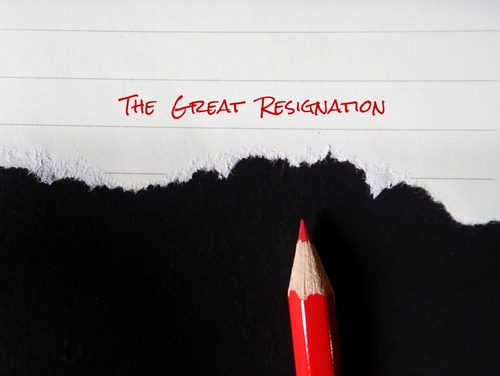For more than a year and a half, no topic has been more pervasive in the HR realm than employee turnover. Whether you call it the Great Resignation, the Great Reshuffle, or the Big Quit, the ongoing mass exodus of workers has spared few organizations. iHire’s 2022 Talent Retention Report confirmed that notion: An overwhelming 89.4% of employers surveyed experienced turnover in the past year. Of that group, 73.5% attributed “all” or “most” of their turnover to voluntary resignations.
But what else did our fourth annual survey discover? In polling 2,665 workers and 578 employers from 57 industries across the United States, we put to rest some common misconceptions about the Big Quit. Here are five myths about the Great Resignation busted by our research.
Myth 1: The Great Resignation is coming to an end.
Declining employee engagement and job satisfaction rates suggest the Big Quit will persist as long as job openings remain at near-record levels. iHire’s survey showed that job satisfaction dipped 11.7% in 2022—34.2% of respondents were “somewhat” or “very” dissatisfied with their jobs. Meanwhile, 29.5% of employers said they have noticed a decline in employee engagement—or an increase in “quiet quitting”—in the past year. The latest Bureau of Labor Statistics data supports this hypothesis, as the number of quits in September (4.1 million) changed very little compared with previous months, and the number of job openings grew to 10.7 million.
Myth 2: Salary is the sole reason people are leaving their jobs.
As the saying goes, “people don’t leave jobs; they leave bad bosses.” The top reason employees surveyed gave for leaving their last job involved issues with management—43.7% of employees who quit a job in the past year did so because they were unhappy with their manager or supervisor. However, money is still a key piece of the retention equation and was a close runner-up to poor management, as 43.4% quit because of unsatisfactory pay. Furthermore, 71.8% of workers said a pay raise would convince them to stay in their current role if they were offered a new job elsewhere.
Myth 3: Employers aren’t acting to prevent turnover.
The sheer volume of quits doesn’t imply that employers are sitting around doing nothing to stop associates from seeking greener pastures. iHire’s survey showed that a mere 7.5% of employers did “nothing” to improve retention in the past year. The most popular tactics for increasing retention revolved around compensation—72.1% of employers said they had given pay raises, and 46.5% said they had given bonuses in 2022 to improve retention. In addition, 37.1% gave meaningful employee recognition, 35.4% allowed for more flexible schedules, and 26.4% expanded professional development opportunities to prevent turnover.
Myth 4: Workers are concerned about layoffs.
Despite the U.S. economic situation, the workforce is optimistic about the future. In iHire’s survey, 73.1% of employees said it was “not likely” they would be laid off from their jobs in the upcoming 6 months. At the same time, just 5.0% of employers said their turnover in 2022 was due to involuntary quits (layoffs and terminations).
Myth 5: Required “return to the office” is driving resignations.
There has been much speculation in HR circles that remote employees would rather quit a job than return to work “in person.” Our survey, however, suggests the ability to work remotely is not a deal breaker—only 3.9% of workers said they quit a job this past year because they were required to return to the office when they wanted to continue to work remotely. Similarly, 7.5% of employers said departing employees cited the inability to continue working from home as a reason for leaving in 2022.
Although the labor market can change at the drop of a hat (as we learned in 2020), employee resignations will continue if employers don’t meet the needs of their evolving workforces. While pay raises and bonuses help, they only go so far. Retention begins with creating a positive work environment rooted in psychological safety, fostering relationships and trust between employees and management, and creating an engaging company culture that puts people first.
Steve Flook is President & CEO at iHire.

